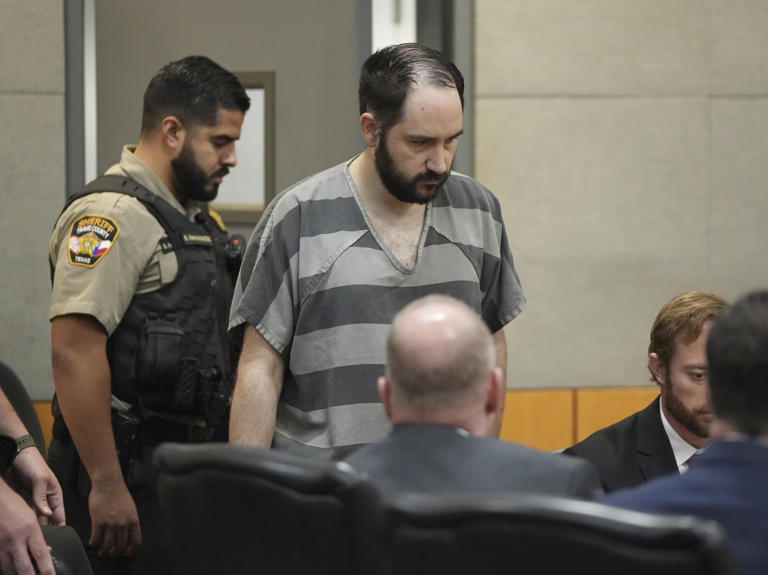“Texas governor pardon, Daniel Perry, Garrett Foster, Black Lives Matter protest, self-defense laws, Stand Your Ground, political influence in judiciary, Tucker Carlson, racial injustice protests, Travis County legal response”
In a controversial move, Texas Governor Greg Abbott issued a full pardon for former U.S. Army sergeant Daniel Perry, who was convicted of murder for fatally shooting Garrett Foster, an armed demonstrator, during the 2020 protests against police violence and racial injustice. This decision has sparked significant debate and drawn criticism from various quarters.

The Incident and Legal Proceedings
The fatal incident occurred in July 2020 when Perry, working as a ride-share driver, encountered a Black Lives Matter protest in Austin, Texas. Garrett Foster, a white Air Force veteran, was among the demonstrators and was carrying a rifle. Witnesses testified that Foster did not raise his weapon, but Perry claimed self-defense, stating that Foster had pointed the rifle at him, prompting him to shoot. In 2023, Perry was convicted of murder and sentenced to 25 years in prison. Prosecutors argued that Perry could have avoided the confrontation but chose to engage, while Perry’s defense maintained that he acted out of fear for his life.
The Pardon
Governor Abbott’s decision to pardon Perry came after the Texas Board of Pardons and Paroles unanimously recommended it. Under Texas law, the governor can only issue a pardon with the board’s recommendation. Abbott, who has been in office for three terms and typically reserves pardons for minor offenses, emphasized Texas’ robust “Stand Your Ground” laws, asserting that Perry acted in self-defense.
Abbott’s decision was influenced by public and political pressure, notably from conservative media personality Tucker Carlson. Following Perry’s conviction, Carlson urged Abbott to intervene, leading the governor to direct the parole board to review the case. The board’s recommendation and Abbott’s subsequent pardon have been criticized by many, including Travis County District Attorney Jose Garza, who condemned the pardon as politically motivated and a subversion of justice.
Reactions and Implications
The pardon has elicited strong reactions from both supporters and detractors. Perry’s attorney, Clint Broden, expressed gratitude for the pardon, reiterating that Perry acted in self-defense when confronted by an armed individual. Broden also acknowledged the tragedy of Foster’s death but emphasized the importance of self-defense laws.
On the other hand, Foster’s girlfriend, Whitney Mitchell, who was with him at the time of the shooting, denounced the pardon as an act of “lawlessness.” She criticized Abbott for undermining the jury’s verdict and suggested that the pardon sent a dangerous message that political views could justify lethal force.
Broader Context and Controversy
The case of Daniel Perry is set against the backdrop of national protests sparked by the killing of George Floyd by a Minneapolis police officer. These protests highlighted issues of racial injustice and police violence, leading to widespread demonstrations across the United States. The shooting of Garrett Foster during one such protest added to the tense and polarized atmosphere.
Perry’s social media history, which was revealed during the trial, played a significant role in the prosecution’s case. His posts and text messages indicated a hostile attitude towards Black Lives Matter protests, with one post stating, “It is official I am a racist because I do not agree with people acting like animals at the zoo.” These revelations painted a picture of Perry as someone predisposed to violence against protestors, undermining his self-defense claim.
The Role of PTSD
During the trial, a forensic psychologist testified that Perry suffered from post-traumatic stress disorder (PTSD), stemming from his military service in Afghanistan and childhood bullying. This testimony aimed to provide context for Perry’s actions, suggesting that his experiences may have influenced his perception of threat and response during the incident.
Political and Legal Ramifications
Abbott’s pardon of Perry has significant political and legal ramifications. It underscores the influence of political pressure and media in judicial matters, raising concerns about the impartiality of the legal process. Critics argue that the pardon sets a dangerous precedent, potentially emboldening individuals to use lethal force under the guise of self-defense in politically charged situations.
The case also highlights the ongoing debate over “Stand Your Ground” laws, which allow individuals to use force, including deadly force, without retreating if they believe they are in imminent danger. Supporters of these laws argue that they protect the right to self-defense, while opponents contend that they can be misused to justify unnecessary violence.
Conclusion
Governor Greg Abbott’s pardon of Daniel Perry has reignited debates over self-defense laws, political influence in the judicial process, and the broader implications of such decisions in a polarized society. As the nation continues to grapple with issues of racial injustice and the appropriate use of force, cases like Perry’s underscore the complexities and contentious nature of these discussions. The pardon may bring some closure to Perry and his supporters, but it leaves lingering questions about justice, accountability, and the role of politics in legal decisions.
Read More-